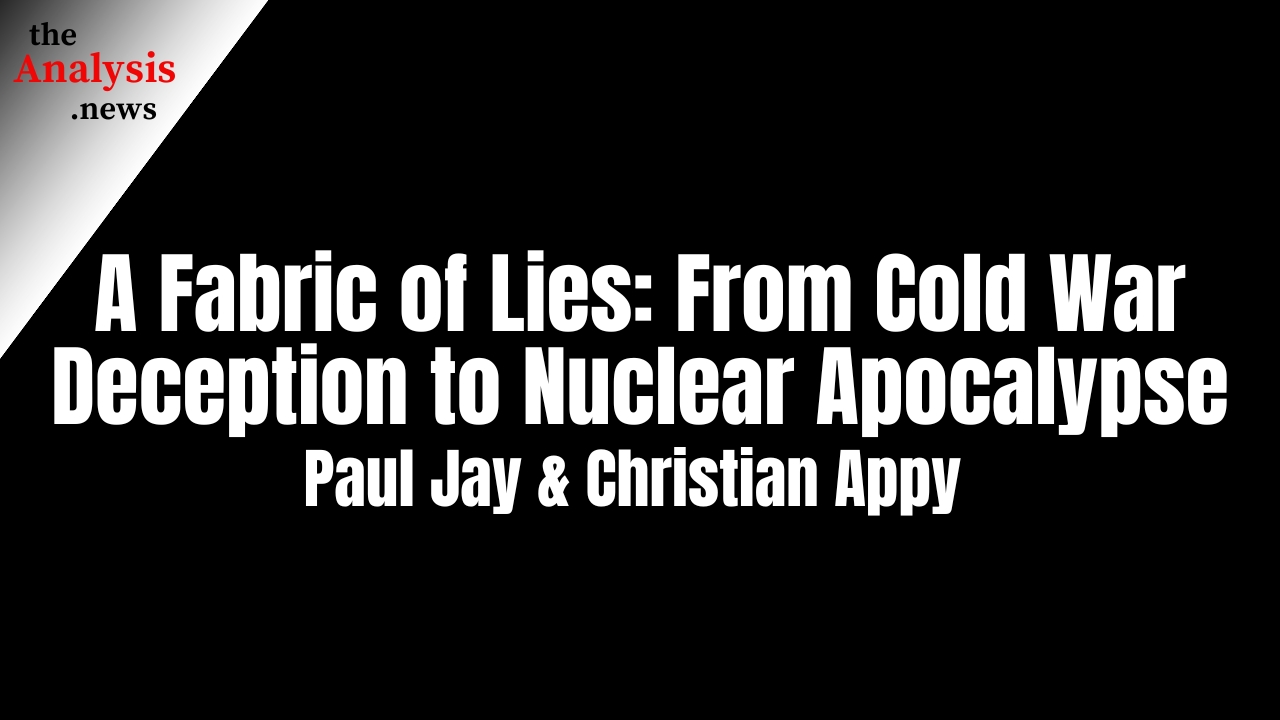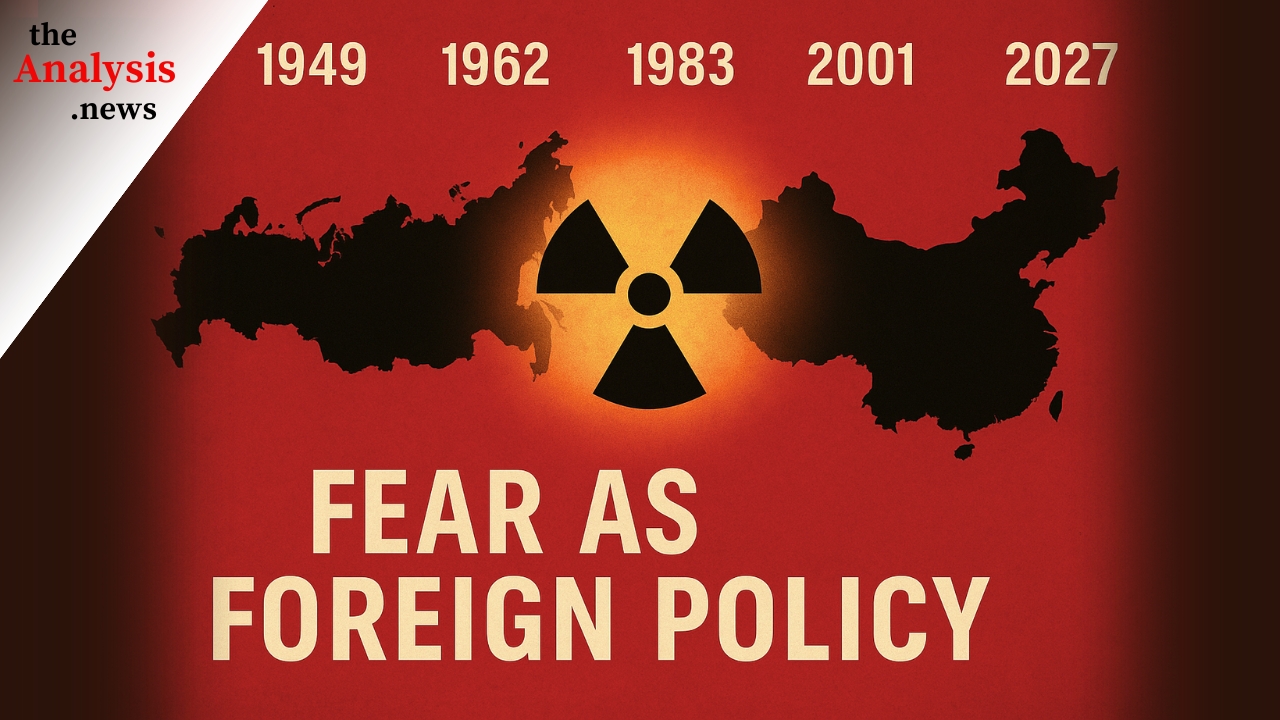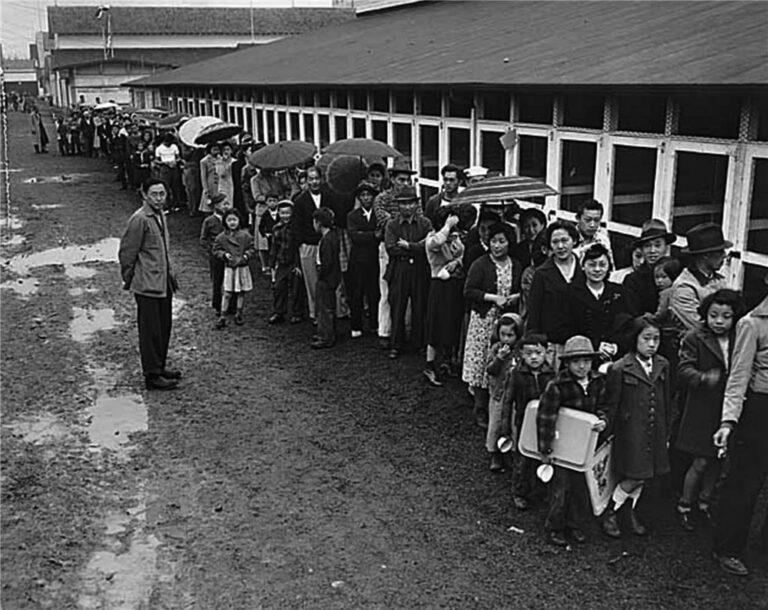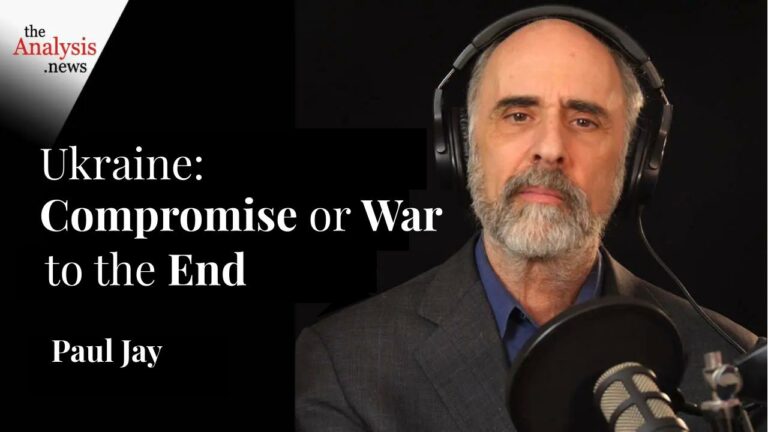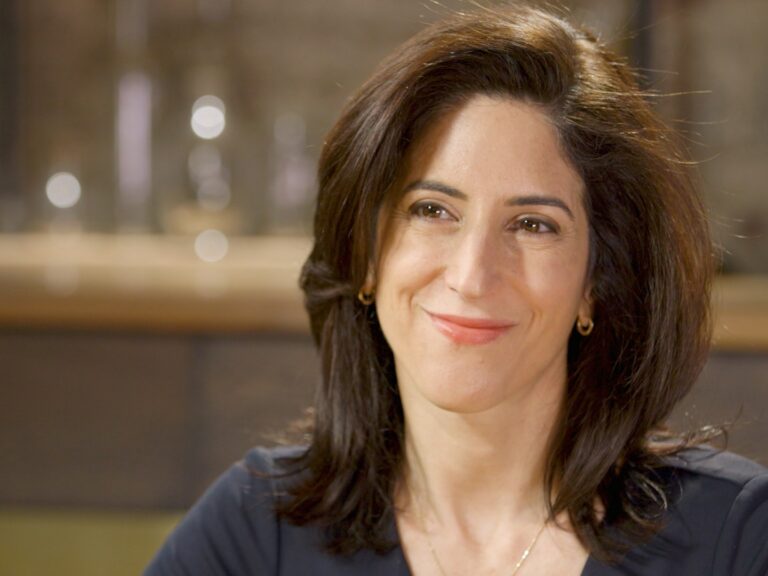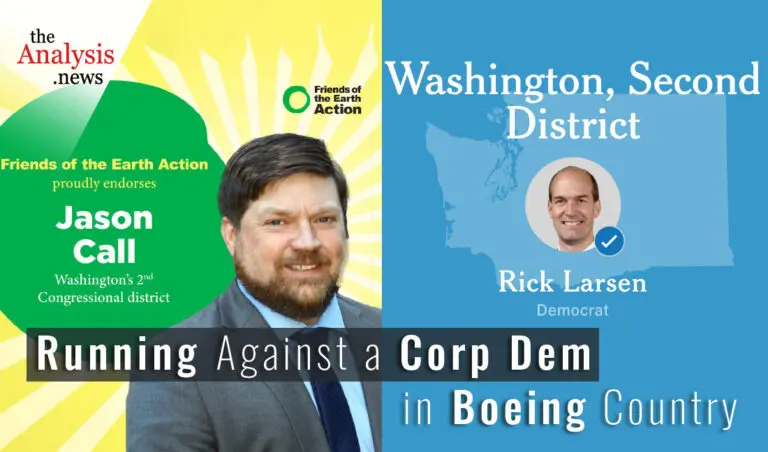Dick Cheney, architect of the Iraq War, died on November 3rd. The next day, democratic socialist Zohran Mamdani won New York’s mayoral race. Col. Lawrence Wilkerson, Colin Powell’s former Chief of Staff, calls the timing symbolic of America’s potential turning point. Speaking from inside the Bush administration, Wilkerson delivers a scathing account of how Cheney became “co-president,” systematically lied about Iraqi WMDs, and led the nation into an illegal war. He explains why Powell’s UN presentation was built on false intelligence, how the administration abandoned international law and authorized torture, and why Obama failed to hold anyone accountable. “We should have all been tried for war crimes,” Wilkerson states. From the lies that killed a million Iraqis to complicity in Gaza’s genocide, this is essential viewing on American empire and accountability.
Paul Jay
Hi, I’m Paul Jay. Welcome to theAnalysis.news. On November 3rd, Dick Cheney died. On November 4th, Zohran Mamdani was elected mayor of New York. Many people have commented on the timing of this. I also thought it was rather interesting.
Dick Cheney was a member of the long line of neoconservatives and other members of the American state, whether in the military or in the political establishment, that you could say begins to some extent after the end of World War II, and it’s a history of the Cold War. It’s a history of the fabric of lies of the Cold War, anywhere from the foundational lie of exaggerating the Soviet military threat by the Truman administration, even though the CIA was telling the Truman administration there was no actual Soviet military threat to Western Europe or to the United States. The Soviet Union was in a defensive position.
That’s according to the CIA and, of course, many other historians since, and those who have checked the Soviet archives have confirmed all of this. But it’s one big lie after another to justify a massive expenditure in aerospace and in the military-industrial complex, as Eisenhower called it, especially at the nuclear weapons complex. Anywhere from the exaggerated bomber gap, saying that the Soviets had more bombers that could drop atomic bombs than the U.S., and of course, it was the other way around. The Americans had far more bombers than the Soviets did.
Then in 1960, Kennedy ran on part of his campaign being about the missile gap, which, again, supposedly the Americans had only 40, and the Air Force and Kennedy were telling people that the Soviets had a thousand. It turned out that the Americans only had 40, but the Soviets only had four. It goes on, lie after lie after lie, to the Vietnam War and the Gulf of Tonkin incident, and the whole lies in the fabric of the rationale for the Vietnam War, which Daniel Ellsberg exposed in the Pentagon Papers.
But in more recent times, the big lie was the war in Iraq, which led to the death of at least a million people and probably more, and chaos in the whole region. And that, of course, was a big lie, that there were weapons of mass destruction in Iraq. That Saddam Hussein, at one point, we were told by Colin Powell, I believe under the directions of Dick Cheney and others, given false information being funneled to Powell that there’s a ring of scud missiles surrounding Baghdad, pointed at Israel, on and on. Of course, if any of that had been true, I don’t think there would have ever been a U.S. invasion of Iraq.
At any rate, Dick Cheney was the leader of the lies about the Iraq War, and foundational to that whole history of lies, that whole history of the rationale for a military-industrial complex was a profound demonization of socialism. It wasn’t just an attack, an exaggeration of what the Soviet Union was. As much as the Soviet Union was internally a police state, it was not externally a military expansionist power, and that was very much known.
It’s very obvious that the first big war, Korea, the Soviet Union did not intervene in, and then the next big war, which was supposedly, again, against Soviet expansionism, at least within the realm of that, was Vietnam, which the Soviet Union also didn’t intervene in. This was a war against the Vietnamese National Liberation Movement. And that is the heart of the Cold War, that it’s really been about countries that want to become independent from the American-controlled global economy. That’s a nice way to say hegemony.
You can see that from the coup in 1953 against Mosaddegh, who wasn’t even a socialist; he was just a Nationalist. But this fundamentally was a war against countries that wanted to have independence, wanted to have socialism. It’s the height of irony that Dick Cheney, who fought and used these kinds of scared tactics about the scourge of socialism and communism and all that, dies one day before a socialist gets elected mayor of New York.
So, yeah, it’s ironic, but I think it’s more than ironic. It does show, to me, at least, and it’s not just among younger generations who voted for Mamdani. Older people in New York did, too. Not only did they vote for free buses and subsidized groceries and so on, but they also voted for a guy who condemned the Israeli genocide in Gaza. So it wasn’t just about some reforms. And still, apparently, if you exclude the Orthodox Jews, especially in Brooklyn, in Queens, too, but if you exclude them from the calculation, a majority, by a slim amount, of Jews in New York voted for Mamdani.
So they voted for a guy who has unapologetically denounced genocide in Gaza and unapologetically declared himself a socialist. So we’re in some moment of change. No doubt, New York is particular. It doesn’t represent the whole country, but there was a lot of celebration across the whole country about Mamdani’s victory. In some ways, it’s too bad Cheney didn’t get to see that.
Joining me in a few seconds to talk about his take on Cheney is Colonel Larry Wilkerson, who was Colin Powell’s Chief of Staff, both at the Joint Chiefs and later in the State Department, and had quite a bit of direct intervention with Cheney. I first interviewed Larry, jeez, it must be about 17, 18 years ago, at least, and in that very first interview, Larry told me that not only should Dick Cheney and George Bush be charged with war crimes because of what happened in Iraq, but he thought he should, too. He, Larry, should, too.
I personally think Larry’s made up and then some for whatever his role in those events was. Everybody else, more or less from that administration, including Cheney, cashed out after they left government, became very rich working in one way or the other for the military-industrial complex or some of the think tanks that get paid and subsidized by the military-industrial complex. Well, Larry didn’t do that, quite the contrary. As far as I know, Larry more or less lives on his pension, having worked as a professor and having been in the military for so long.
Larry stuck his neck out when he realized what was going on. He’s never stopped vigorously, and I’m trying to think of the right word, with a serious scalpel dissecting U.S. foreign policy comprehensively, and also in particular, the Israeli role in creating an apartheid state, and suffering for years. This is far before anybody like Tucker Carlson all of a sudden discovered he was against the Israeli genocide. In fact, we should point out that Tucker Carlson was a supporter of the war in Iraq, and so were many of these right-wingers who are all of a sudden denouncing the Israeli genocide.
Personally, I’m happy that anyone who denounces the genocide does, but these were people who were in on it with Cheney at the time. Now, after the failure of the Iraq War, I should say the debacle of the Iraq War, they can disassociate themselves from those neocons. But they were there cheerleading at the time. Anyway, one of the people who has been ever since he left the government, was certainly not a cheerleader, was Larry Wilkerson, and he now joins us. So, thanks for joining us, Larry.
Col Lawrence Wilkerson
Good to be with you, Paul.
Paul Jay
In full transparency, and to my complete amazement, as I remember sitting back watching Colin Powell at the UN, Larry and I have become friends. I never would have predicted it, but he’s someone I have a great deal of respect for. So, Larry, can you? I don’t know if you want to respond to anything I’ve said. It’s up to you, but what I do want to ask you about is starting with when you first encountered Cheney, especially those years leading up to the Iraq War, and looking back at his life and his role. I should say he wasn’t a signatory to the project for the New American Century, as far as I know.
Col Lawrence Wilkerson
No.
Paul Jay
But he was a close collaborator with the people who created that vision that led to, according to Senator Bob Graham, 9/11. We can get into that maybe a little bit later, but certainly led to the abrogation of the 1972 Anti-Ballistic Missile Treaty, then the Iraq War, and so on. So, Larry, what’s your take on Cheney?
Col Lawrence Wilkerson
I can’t let some of the remarks you made pass.
Paul Jay
I thought not.
Col Lawrence Wilkerson
Without comment. I think it’s better to describe the Soviet Union as the equivalent of us and the two giants standing off against one another, armed to the teeth with nuclear weapons, and one of their philosophies being a little bit different from the other ones. But both of them were, in the sense of the competition of the Cold War, threats. I would point out the Hungarians in 1956 and the Czechs in 1968 as evidence thereof, and I could cite others, too.
Paul Jay
Okay, well, I got a suggestion. Why don’t we do another show just about that?
Col Lawrence Wilkerson
Sure.
Paul Jay
Because I don’t agree, and neither did the CIA, but I understand what you’re saying.
Col Lawrence Wilkerson
You can cherry-pick the CIA all day long and find views from different Sovietologists and different people. Some of them thought one thing, some of them thought another. Even the man who pinned the cable that more or less started the doctrine of containment had some pretty rough things to say about the USSR.
Paul Jay
Well, you’re talking about George Kennan, and Kennan recanted what he said. He said in this famous telegram of his, penned by Mr. X, or it was an article in Foreign Affairs. I can’t remember.
Col Lawrence Wilkerson
I think so, yeah.
Paul Jay
Yeah, he later said it had been completely misconstrued. He said clearly that the Soviet Union was not a military threat. It was a political ideological threat.
Col Lawrence Wilkerson
Yeah, I’ve talked to George Kennan. I’ve been in the office when Colin Powell, Henry Kissinger, and Brent Scowcroft talked to George Kennan right before he died and earlier.
Paul Jay
I can only talk about what’s on the record. I never had the pleasure.
Col Lawrence Wilkerson
Well, Kennan had different views about different things. I think it is fair to say that Kennan’s ultimate view, and this is the important thing that he said in essence, and he stuck to this right up to his death. “The Soviet Union will be defeated, as it were,” whatever that means, “will go down if we just live up to the example of our Constitution, the Declaration of Independence, our founding fathers’ better views, all those things. If we live up to what we purport to believe in and aren’t too hypocritical about it, the Soviet Union will disappear.” I think he thought it would probably do it in his lifetime, and it turned out he was right, so.
Paul Jay
Well, let’s have a whole discussion on that. People know I’m working on this film, How to Stop a Nuclear War. Right now, I’m working on the whole Cold War period.
Col Lawrence Wilkerson
Yeah.
Paul Jay
I’d love to discuss it with you, and let’s do it on camera. But for now, I think we can agree-
Col Lawrence Wilkerson
The Cheney phenomenon is, I think, a hiccup, if you will. It’s a dangerous and brutal hiccup, but it’s a very different kind of situation that coalesces around a number of things that haven’t been in the post-World War II era, and that’s my teaching era. I know a lot about the post-World War II era, particularly with regard to what I taught, national security decision-making. So, there is no national security decision-making team that even remotely, not Nixon’s, not Kennedy’s, not Johnson’s, not Ford’s, short-term one. Not any President since the 1947 National Security Act has had the idiosyncratic and strange team that assimilated around what was probably the most inexperienced president in the post-World War II era, George W. Bush. And into that inexperience flowed a dream team, the New York Times said, which turned out to be a un cauchemar team, a nightmare team. There’s no question about that first term. It was a nightmare team.
Paul Jay
You’re talking not only, but specifically about the team Rumsfeld, all the neocons, Richard Perle, and so on.
Col Lawrence Wilkerson
Right. It was an extraordinary group of people who could not function smoothly the way, for example, I had watched Powell and Cheney as Secretary of Defense, Baker, Scowcroft, and others function in his father’s administration from ’89 to ’93. That was probably the best decision-making team. I used them as an exemplar when I taught. You could disagree with their policy and their decisions, but in terms of the smoothness and well-oiled machine with which they made decisions, it was extraordinary.
This was totally the opposite. The opposition, if you will, in that opposite, was principally the vice president, often teamed up with the Secretary of Defense, and quite often, teamed up with a neophyte national security advisor who was billed as being experienced, wasn’t, and quickly ascertained that she had to get very close to the president if she wanted her prize. Her prize was to be Colin Powell’s replacement.
Paul Jay
You’re talking about Condoleezza Rice.
Col Lawrence Wilkerson
Right. Whenever that might occur. If it occurred at the end, as he said, he would serve for four years and leave, or if he were to resign or leave, she’d take offense. One reason, I think, that the situation was so vastly different from the previous Bush, there was no discipline. It’s like Trump now. Marco Rubio is not a national security adviser. He’s a Secretary of State, bent on attacking everyone he can in Latin America, and that takes all his time, thank you very much. So he’s not doing anything as National Security Advisor.
Well, Condi didn’t either. She just got close to the president. How do you get close to the president? This is the chemistry that I’m talking about with regard to this team, and chemistry is essential to understand national security decision-making. She figured out very early on that if she took Colin Powell’s side as Secretary of State, she would alienate the president, and there are various reasons for that. But if she took Dick Cheney’s and Donald Rumsfeld’s side, she would be three to one against Powell, and the president was more often than not to take their side.
So, that’s how she got very close to the president. At one point, they were speculating in the press as to whether or not the president might be having an affair with Condi. They were so close, and the photographs and everything showed that. That was nonsense. Bush was-
Paul Jay
But these guys, I mean, that’s an insider view.
Col Lawrence Wilkerson
Let me finish.
Paul Jay
Yeah, go ahead.
Col Lawrence Wilkerson
Please, let me finish. So what happened was you had three against one with a president who would most often side with the three, and that’s what Cheney flowed into to become the President of the United States, in effect. Shirley Anne Warshaw at Gettysburg College is absolutely right. The title of her book is The Co-Presidency of Bush-Cheney, a Political Scientist for 31 Years. I told her, when I saw the manuscript and the title, I said, “You need to change that to Cheney Bush Co-Presidency, because the primary person in the co was Cheney, not Bush.”
That made all the difference in the world to a man who really brought, as you said in your introduction, into the White House, not only the desire to be president and, in a nefarious way, to have effected it. He selected himself to be the head of the Vice President Selection Committee, then selected himself to be Vice President, and wreaked havoc in the way that Dick Cheney wanted to wreak havoc on the national security apparatus. To Colin Powell’s chagrin, he could do nothing about it.
His best metaphor with that, I think I mentioned this to you before, was that he came back one day from a National Security Council meeting. He said, “I’ve got a real problem.” I said, “What is it?” I wanted to suggest a few things, but I said, “What is it?” He said, “Cheney knows how to get the president to pull out his 45 and start shooting, and I don’t know how to get him to put it back in the holster.” That was a pretty good metaphor for what happened for that entire time.
Part of that was Karl Rove, Dick Cheney, and Condi, whispering in the president’s ear, sometimes cavalierly, sometimes very seriously, Dick Cheney and Karl Rove. “Powell is apt to be your most formidable opponent in 2004.” President Bush’s one driving desire with regard to the Oval Office was to beat his daddy and be a two-termer. That was the Trump card for George W. Bush with respect to Daddy. “I’m going to get a second term.” So he got really tight with Israel. That’s a lot of why he won against Al Gore, and he got really tight with Israel again, giving Ariel Sharon his head in the Middle East, which we see the results of today, in order to win a second term. But he was very worried about Powell.
In 1995, Powell had been courted by both political parties. Each party had built an entire apparatus across the country, ready to go, committees in every state, and was just waiting for him to select a party, much the way Dwight Eisenhower had done. Well, Powell came out in ’95 at the Ramada Inn in Alexander and said, “I’m not interested,” and that ended there, but no one in the political world believed that was final. So that’s what Bush feared about Powell. So you had this decision-making process I just described, and you had the president fearful of his Secretary of State becoming the opponent in 2004 that he’d have to be, and he couldn’t have beaten him.
So you had this incredible chemistry, and I’m just giving you a broad brush, in the decision-making apparatus that Cheney dominated, and utterly dominated with regard to everything from Iran to Iraq. The only thing he didn’t care about was No Child Left Behind. “That’s yours, Mr. President.” He didn’t care about HIV/AIDS, which was Powell’s big issue to get it plussed up, both globally and in the United States, the funds, and did. That’s one reason why Bush is still lauded and praised in Africa.
Paul Jay
So what do you make of the way most of the mainstream media, at least, is dealing with Cheney’s death, which he’s now a statesman, the years of public service? You described him, like I say, in more than one of our earlier interviews, as essentially a war criminal that should have been prosecuted, but he wasn’t. In fact, when Obama was elected, he very much evaded his responsibilities under international law, which I think is something you also pointed out at the time. Obama actually had a responsibility to at least launch an investigation into the war crimes of the Iraq War. But he says, “No, we have to look forward, not backwards,” Obama says, to avoid dealing with the reckoning. Talk about that period, and when you start to realize the truth of what’s going on in Iraq?
Col Lawrence Wilkerson
Let me just address that last point you made briefly. Obama should have been tried for war crimes, too.
Paul Jay
Because of that?
Col Lawrence Wilkerson
Which is to say, in particular with regard to Libya, that we don’t hold accountability. In the empire, there is no accountability. You don’t hold accountability for your predecessor because then you might be held accountable yourself, or you might have someone in your party held accountable. So you don’t want to do that. We don’t ever hold anyone accountable.
Now, is that a tragedy? Yes, I think it is, because if you don’t hold people accountable, particularly for war crimes, then what are you up to? What are you going to do ultimately? Well, we’re seeing it right now. We’re seeing it. We’re supporting the greatest series of war crimes since 1940, ’41, ’42, ’43, ’44 on the face of the Earth in Gaza, in Syria, in Lebanon, and other places where Israel is playing around. They’re not playing around because Israel is Israel and owns us. They’re playing around because they belong to us. They are our attack dog in Southwest Asia, in the Middle East in general, and even in North Africa.
As the foreign minister at the IISS-sponsored meeting in Manama, I believe, Bahrain, said two days ago, finally admitting the truth, but he didn’t go deeply enough. He said, “This is Bahrain. Iran is not the cause of instability in the region. Israel is.” And everybody’s going around now saying, “Oh, man, they finally admitted it,” ‘ blah, blah, blah, blah.’ Well, he should have said, ‘and the United States of America.’ But he was never going to say that because we’re his sugar daddy, too, but that’s the real problem. That’s the problem in that region. I rambled on. I didn’t get to your question. What was your point?
Paul Jay
It’s okay.
Col Lawrence Wilkerson
I was doing what you did.
Paul Jay
My question was, take yourself back to those days because you were in on it. I don’t know, meaning-
Col Lawrence Wilkerson
We should have all been tried for war crimes. I was a political appointee. That’s the reason I told you what I told you. We should have all been tried for war crimes, not least because we had an adjutant general who declared a theory of torture that said its definition, in essence, was just short of death. Who then hired physicians, God forbid, their Hippocratic oath, to stand by the torture table, literally, and determine when the person was going to die, and therefore, be able to say, “Uh-oh, you’re torturing. He died.” I mean, what an absurd thing we did.
And then on top of it all, the President of the United States officially authorized from the Oval Office the torture of other human beings. You know, I know. We have tortured, from the Indian Wars forward, probably. I don’t think we tortured during the Revolutionary War. George Washington was very adamantly opposed to it. He accused the British of doing it, which they did. And he said, “We are not going to be like them. That’s our high ground. That’s how we win. We are different from them.”
I think he was serious about enforcing that, not to say there weren’t some people who did down at the bottom ranks. We have tortured through our military, CIA, and others, once they’re part of the apparatus throughout our career as a nation. But we have never blessed it from the highest office in the land. George W. Bush should have been hauled before the International Criminal Court as a war criminal.
Paul Jay
But the war itself was a war crime?
Col Lawrence Wilkerson
Absolutely, but look at what’s happened to that. I mean, go back to Nuremberg, look at one of the basic principles that… actually, I think it was-
Paul Jay
Just let me quickly, for younger viewers who don’t know what Nuremberg was, tell us fast, and then keep going.
Col Lawrence Wilkerson
Yeah. World War II resulted in a system in both theaters, the Pacific and the European, the European first, of course, principally because of the Holocaust and the pressure there from a series of tribunals, and this one got called the Nuremberg Tribunal. It was held in Hitler’s favorite place, Nuremberg. They tried various; about 22 were actually brought before the tribunal, Nazis and Nazi supporters in Germany.
The essence of the production, though it was ranked with hypocrisy… I mean, who was it that said, “Hypocrisy is the homage vice pays to virtue.” A very clever statement, and it’s absolutely true. It was hypocritical to the maximum. If you look at the French position, the USSR’s position, the American position, the British position, the British wanted to shoot them all. They didn’t want to have trials. They wanted to shoot them all, and the Russians wanted to take… And this was a huge argument. The Russians wanted to take them all back to Russia, have show trials, and then shoot them. It was hypocrisy par excellence, but I think every jurist in the world, worth his or her salt, will admit this or will say this with pride, what flowed out of it was international criminal law. That was good because it said to people who would start a war of aggression, “If you do, there’s a body of law we can come after you with.”
Paul Jay
What was the wording? Something like “The highest crime against humanity is a war of aggression.”
Col Lawrence Wilkerson
Yes. It’s amazing how we, the United States of America, have done our best in the last 20 years to crucify, bury, and eviscerate all the things that were accomplished despite the hypocrisy at such places. I go on to ’48, I believe it was when we started the Geneva Conventions, and we had the the four conventions, including POW, civilians, sick and injured sea men, and sick and injured soldiers on the battlefield, and all the conventions that go along with that, which are as important for the law of land warfare, the law of sea warfare, and so forth.
We’re destroying all of that, and boy, did we take the Geneva Conventions cavalierly in the Bush administration? Powell’s battle with Will Taft’s lawyer, to try and get Dick Cheney, George W. Bush, and Condi Rice to understand that if they abandon Geneva, it would be tragic, and we would have a bill to pay that would come due someday. And they… “No big deal. We’re abandoning Geneva. We’re going to be…”
Paul Jay
One of the things that came out of Nuremberg and then the UN charter was a war of aggression, essentially, if I understand it correctly, if your country isn’t under imminent threat, you cannot attack, which is why the whole BS about weapons of mass destruction in Iraq was created.
Col Lawrence Wilkerson
Yes.
Paul Jay
To create the fig leaf-
Col Lawrence Wilkerson
And the same thing in Libya.
Paul Jay
Saddam Hussein was supposed to have had weapons of mass destruction, nuclear weapons. That was the pretext for the invasion. For people who are younger who didn’t go through all this, the UN sent in Blix and others to investigate and to find these nuclear weapons. They didn’t find any. They spent weeks looking, and it was finally when the UN inspection team led by Hans Blix declared, “We don’t find anything,” and actually said in the press, “Americans, if you know where they are, tell us, and we’ll go look, because we’ve looked everywhere you’ve told us, and there aren’t any.” In fact, it’s once, I think, I’ve always thought, it’s because the U.S. knew, “Okay, he doesn’t have it. Now we can invade.” That was the actual point. If he really had any of this stuff, you couldn’t invade, which is why they can’t invade North Korea.
The underlying big lie was one; they tried to justify this within international law. But then it became clear there was no imminent threat to the United States, and they invaded anyway, they being the U.S.. That is, in the more modern times, the real breakdown of the whole concept of international law. It opens the door to everyone who has any real power, defying it. In fact, these days, they don’t even talk about international law. Now it’s a rules-based order. What does that mean? It’s our rules or the highway?
Col Lawrence Wilkerson
There are no rules in it, not for the empire. None whatsoever. You bring up a good point. The one thing that really made Powell’s presentation at the United Nations on February 5th, 2003, powerful was the nuclear threat. The other thing is, really, we did some sophisticated poll analysis, in both international audiences and domestic, and that was the real threat. I know Powell felt that way, too, that nuclear weapons were the real threat. His own international intelligence bureau, INR, at State, Carl Ford was the Deputy Secretary, or was the Assistant Secretary for INR. Tom Fingar, a really brilliant intelligence man, was the Deputy. They dissented on George Tenet’s analysis that Saddam had an active nuclear weapons program, and it turned out, of course, that they were right.
But then throw into the mix, too, that Hans Blix came to see Powell several times. The seminal time I was not in on, but Powell debriefed me on it. Blix said, “If you will let me back in, I will give you certitude, as close as humans can give you certitude, that he either has or doesn’t have a nuclear program. I’ll look at the other things, too, and give you the same kind of degree of certitude.”
That’s when Powell convinced the president, and this, he thought, was his major achievement in this regard, and we got the UN Security Council resolution on the 8th of November, as I recall, 1441, that allowed this, was going to prove one way or the other, and Blix was going to certify. Then Cheney gave the speech at the VFW, I think it was, and didn’t even consult with anyone about the speech. He never did. He gave speeches. Nobody vetted them at all. Nobody vetted them. I don’t even think the president saw Cheney’s speeches beforehand. In the speech, he said that essentially the inspectors wouldn’t prove a thing and accused them of being complicit. They wouldn’t prove a thing.
So, that just blew all of that momentum that 1441 had created out of the water. And then we had to try to get a second resolution to get the UN to actually go ahead and authorize the use of force because the momentum had been killed. Of course, Dominique de Villepin, the French Foreign Minister, much to his credit, and the Russians, Colin Powell at the UN, will veto. So we had to withdraw the second resolution because we knew that we wouldn’t get it passed, and we didn’t want the embarrassment of putting it forward, and the momentum that that would create against the war that the UN said,” No.” We just go ahead and do it.
So there we are, illegal. Under that law that we were talking about, under international law, we are the aggressor now. We’re illegal. You can’t declare that there’s a threat and have the international body say they don’t see that threat, and then you say to the international body, “Sorry, I see it,” and go do it; that’s a war crime. Maybe it’s a lesser degree of war crime than just blatantly doing it.
Say, Putin right now in Ukraine, he’s saying he saw a threat, and I’m the one who believes he saw a threat. I can tell you what that threat was. I can tell you what it is right now, and that threat was worthy of his starting this special military operation, but he’s been declared a war criminal, and he could be hauled before the ICC, too, because of that rule. We would never do it to ourselves. That’s the real imperfection.
Paul Jay
It opened the door, but I have to say about Putin, he never went to the Security Council. In fact, they never launched a single complaint anywhere before they invaded.
Col Lawrence Wilkerson
He knew it wouldn’t do him any good.
Paul Jay
He could have made the case-
Col Lawrence Wilkerson
Well.
Paul Jay
If there even was a case. That’s another topic for another show because you and I don’t agree on this.
Col Lawrence Wilkerson
They did make the case post-case.
Paul Jay
Yeah, after they invaded.
Col Lawrence Wilkerson
Yeah.
Paul Jay
So let me go back to this because there was another big lie about the Iraq War, which was that Iraq was working with Bin Laden and Al Qaeda. They had to know that wasn’t true.
Col Lawrence Wilkerson
That was the second part of his presentation that we’ve judged from the polling results was powerful because he associated it with 9/11. There was evidence. I saw the evidence, and I can’t talk about it, but sources and methods. There are sources and methods involved, particularly with regard to Al Qaeda. I saw the evidence that there was a connection, but what turned out to be the case after the war was that the connection was specious in its reality, because the connection was Abu Musab al-Zarqawi, who became quite an opponent in the terrorism world and had to be taken out. He was the creator, really, along with some very dissatisfied Sunnis from Iraq, and from the Republican Guard, in particular, of ISIS. And that metamorphosed into a significant terrorist effort.
But its substance was really, and the truth has not been told about this yet, the Iraqi discontented Sunnis who were treated so badly by the Shia in power after our invasion. That caused a real problem, and when you saw those people driving tanks and firing artillery with perfection and all that, that was a Republican Guard doing that in equipment that they had stolen from Iraq. So it created all that, but that Abu Musab al-Zarqawi connection was there and was vivid in what the National Security Agency gave us in terms of, and this is as far as I can go, intercepts. We couldn’t show it because it would have compromised the way we were doing what we were doing at the time against a very dangerous enemy.
So, there were aspects of it that were convincing because they were true. They did not build a picture, however, in any way, fashion, or form, for what we did. They simply didn’t. If a court were sitting on us, they would say, “In accordance with the laws that evolved in the rules-based order that we were supposed to be the chieftains of, we were guilty.” But one of the rules we made in that rules-based order was that anytime anybody declared us guilty in international institutions that we helped to create, we would sanction or go after that international institution or bring pressure to bear on them so we wouldn’t have to stand before the bar.
That was always understood. I don’t think it was understood by Eisenhower and those who really held out aspirations for what they were creating in the ’50s. But later, it becomes very much a modus vivendi, a modus operandi for the empire with respect to the United Nations. Use it when you can punish others and defy it behind the scenes and openly, if necessary, when it’s after you.
Paul Jay
Right [crosstalk 00:42:31]. So, what do you make of the way the press is dealing with Cheney and his death? It seems to me that-
Col Lawrence Wilkerson
Why do we do everything?
Paul Jay
Well, there’s something particular here. Because Cheney is anti-Trump for his own reasons, and his daughter, now, he’s okay. He’s been rehabilitated because he hates Trump. Also, if you really talk about who Cheney was and what he did, you wind up putting the whole national security state on trial, and they don’t want to do that.
Col Lawrence Wilkerson
Absolutely. I’m convinced the daughter went home and talked to Daddy, and Daddy said, “You need to shift over here like this, take these positions, and so forth, because not only will you be politically successful by doing it, which has not turned out to be so true, but you’ll resurrect my reputation somewhat.” This is the way these people think. This is the way they think.
Paul Jay
Well, it worked.
Col Lawrence Wilkerson
No.
Paul Jay
[inaudible 00:43:32].
Col Lawrence Wilkerson
Yeah, it worked to a certain extent. Yeah, it did.
Paul Jay
So let’s go back to this-
Col Lawrence Wilkerson
That’s the part of MAGA and the part of Donald Trump that I’m really angry at him for abandoning. He apparently has abandoned it. But that part of MAGA, not because it was MAGA, but because it was right, I supported. When he classified the Iraq invasion as the dumbest thing on the face of the earth, I said, “Here, here, brother, you’re right. Bring that philosophy in when you’re elected president.” He didn’t. He hasn’t, and he looks even worse than some of the people that I had to deal with.
Paul Jay
Yeah, but from what I have seen, and I’ve looked, Trump supported the war at the time. He may have said it may not be the smartest thing, but now that we’re there, let’s go full force. He certainly never raised any of the questions.
Col Lawrence Wilkerson
He’s all over the map. I couldn’t even say that I know where he’s going to go on any given issue at any given moment. He’s so mercurial.
Paul Jay
So what does it say that the mainstream press is barely talking about what essentially were war crimes in Iraq?
Col Lawrence Wilkerson
We don’t like it. We do not like it. We do not like revealing our dirty laundry. Oh, we’ll take a little cone here and a little cone there, and we’ll go after Kim Kardashian because her lips are too swollen, or we’ll go after some movie actor who did a bad job at the Oscars, or we’ll go after Martha Stewart, or we’ll go after Jamie Dimon because he’s a bastard, a rich bastard, but a bastard. But we won’t go after ourselves. We’re embarrassed. We’re horribly embarrassed. We hide our heads. We go off in shame, but we’re not going to do it. We are not going to do it.
Paul Jay
It’s very much part of this whole Cold War psyche that America may do bad things, but we do it for good reasons. Everyone else does bad things for bad reasons. But even the Iraq War was a policy mistake. It’s not like some systemic thing about empire, and especially empire-
Col Lawrence Wilkerson
As was Korea, as was Vietnam, as was Somalia, and the humanitarian operation that turned it into a manhunt for Mohamed Farrah Aidid, as was everything we’ve done in the post-Cold War era, frankly.
Paul Jay
So what do you think then, given decades and decades of all of us being pounded with Cold War propaganda in one form or another, and I’m including Vietnam and Iraq within that. Now you get elected in New York, an unapologetic socialist and an unapologetic critic of the genocide in Gaza. And then, Sanders and AOC are probably outside of Mamdani now, the most popular people in the Democratic Party. I would have said Cheney would be rolling over in his grave, but perhaps he’s not actually buried yet. I’m not sure.
Col Lawrence Wilkerson
I have a practical answer for you, and I was thinking about this about a week ago when I was reading a political memoir about New York. I had just finished rereading the very good biography of Teddy Roosevelt, and how he moved up through the New York bureaucracy and then became vice president, to get rid of him because of what he’d done in New York. They wanted to get rid of Teddy Roosevelt. Making him vice president was the kiss of death, and then some dude shot McKinley, and Roosevelt became president. “Oh,” they went running all over the country. “Oh, my God, what have we done?” Because Teddy was going to go after some of the robber barons, and they knew that.
So, as I was looking at that, I was asking myself the question, “Wow, New York was a real powerful entity in America. It was the harbinger of the future. It was the builder of giants of political stature and so forth.” Not anymore. It’s a cesspool now in the political sense. So what does it mean that Eugene V. Debs was finally elected?
Paul Jay
Well, you’d better explain that. Not everyone will get that.
Col Lawrence Wilkerson
Well, you’re talking about a place that doesn’t produce a politician in the mainstream and hasn’t for some time. Those who tried to get into the mainstream, like Cuomo and others, failed miserably. You used to want New York in your portfolio. You wanted it because it was the step to power with [inaudible 00:48:38] boys and others. Not anymore.
Paul Jay
What I’m getting at here is that decades of trying to get everyone scared the hell out of the word socialism-
Col Lawrence Wilkerson
What I’m saying is Mamdani-
Paul Jay
The power of the media in trying to say that any, you know, “Calling Gaza a genocide is anti-Semitism.” In spite of all of that, Mamdani wins.
Col Lawrence Wilkerson
Yeah, and I’m saying he couldn’t have gotten elected in any other American city. Maybe Los Angeles, but I doubt it.
Paul Jay
Maybe Portland.
Col Lawrence Wilkerson
That’s not a comment on Mamdani. That’s a comment on our country. Just as Eugene V. Debs, Wallace, and a lot of other people had really good ideas that would have leavened predatory capitalism.
Paul Jay
This is Henry Wallace, who was Roosevelt’s Vice President.
Col Lawrence Wilkerson
Yeah. Franklin Roosevelt did, and was a traitor to his own class, as one person said to him from his class. He had a lot of help from Francis Perkins and a lot of other people around him, too.
Paul Jay
Ralph Nader told me a few years ago, he didn’t think today you could pass the seat belt law. Never, anymore. But like I say, I think things are changing. While Mamdani may have only been… It may have been New York, and New York is something particular. There were celebrations across the country when he won. I do want to say, too, that Mamdani, I hope, will tell people how difficult this is going to be in New York.
Col Lawrence Wilkerson
Yes.
Paul Jay
This ain’t going to be a cakewalk, even to get the reforms he’s been advocating about buses, groceries, and whatever. There’s going to be a war here, and he’d better make sure all his thousands of volunteers go have a nap, and they get back door-knocking again.
Col Lawrence Wilkerson
Absolutely.
Paul Jay
Because this ain’t going to be easy.
Col Lawrence Wilkerson
This could be a tragedy as much as it could be a success. If we set this one back, really set it back politically and otherwise, who’s going to venture forward in that vein in the future? We will have sealed our doom, and we will have given our country to the most predatory version of capitalism on the face of the Earth. Only one country is up to our level in terms of predatory capitalism, the Jewish state of Israel. That’s the only other state, and that’s why we’re so close. That brings me to what would be my fundamental point about Mamdani and about the shifting in the country, if it’s going to be a positive shift, I hope the hell it is, it’s mostly motivated, indirectly or directly, by what’s happening in Gaza and the American people’s opening view and increasing vision of American complicity, their complicity.
Paul Jay
Well, let me just add a couple of things. One, I know they call themselves a Jewish state, and it has all the theocratic racist implications of that. But as someone who is Jewish, as many Jews who have hit the streets protesting the genocide-
Col Lawrence Wilkerson
Oh, absolutely.
Paul Jay
They’ve said, “Not in my name.” So I don’t even like calling that thing a Jewish state.
Col Lawrence Wilkerson
I would say 75… I have nothing to base this on except my own conversations with rabbis and Jewish friends, and others all across the country. I would say that 75% or better of American Jews are appalled at what Netanyahu has done. Appalled and worried. Worried because they see him as being the instigator of anti-Semitism to a level that might become dangerous, even for those in the United States.
Paul Jay
Let me add another thing, because not only is AIPAC and the pro-Israeli lobby going to continue and increase their opposition to Mamdani and what he represents, but I saw Steve Bannon’s piece yesterday, or he was interviewed somewhere, and it was actually all respectful about Mamdani. He says, “Game respects game.” I actually thought Mamdani’s acceptance speech was a little unnecessarily provocative. It reminded me of Chávez going to the UN and saying, “I smell the sulfur, Bush is the devil.”
He had better be careful here because they are going to really go after him. Bannon is calling for an investigation into Mamdani’s citizenship to see if there’s any even wrinkle they can use as an excuse to deport him, which would be a stupid thing on their part if they did it. It would just rally everyone, but still, they’re going to go to war against Mamdani. Wall Street, the majority, is going to go to war against… And it’s not just Mamdani. It’s this whole thousands of people who helped elect him and people who voted for him.
Col Lawrence Wilkerson
It’s the little people, and Wall Street hates the little people. Jamie Dimon, this morning, was quoted in the New York Times, at least, he’s saying he wanted to work with him. I’m thinking to myself, “I know you, Jamie. You want to work with him? Oh, my God. I wouldn’t want you working with me.” These people are evil. They are evil people. The American Republic needs to awaken to the fact that Teddy Roosevelt and Franklin Roosevelt really had a reason to do what they did. However much we may not like Teddy in other respects or Franklin in other respects, they had a fundamental reason to do what they did, and that was that capitalism was ruining our country. Ruining it. Not because it’s capitalism, but because the people, as Marx so well prophesied, given enough rope, and it’ll hang itself; they’ll sell you the rope with which to hang them.
That’s what we’re doing, and Bill Clinton, William Jefferson Clinton, that pervert, did more to cause this than any president I’ve studied since World War II. He orchestrated the Democrats abandoning their long role of being a counter to this crap that predatory capitalism puts out in favor of joining them in the filthy lucre. And then he joined in the filthy lucre himself, including with Epstein. So, I mean, the Democrats are as much to blame, especially him, as are the Republicans, for the straits we’re in right now. But it’s basically because we let our economic system eat our lunch.
Paul Jay
All right, well, let’s end it there, and we’ll pick it up again soon. Thanks very much, Larry.
Col Lawrence Wilkerson
Thanks for having me, Paul.
Paul Jay
Thank you for joining us on theAnalysis.news. Don’t forget, there’s a donate button. We can’t do any of this stuff without your support. Very importantly, get on our email list if you’re not already on it. You can get that at theAnalysis.news.
Col Lawrence Wilkerson
Pull my address out for the donation.
Paul Jay
If you’re on YouTube, hit subscribe. We are, without question, suppressed on YouTube. The odd video, the algorithms forget to suppress us. So in fact, the last interview I did with you, Larry, I think it’s somewhere close to 90,000. We used to do 80, 90,000 all the time, and then after my reporting on the truth of what happened on January 6th on the Hill and some other reports we did, now, all of a sudden, we’re down. Sometimes we don’t do more than 2,000 or 3,000. We know YouTube’s after us. The best way to watch us, by the way, is just to go to the website because our numbers on the website are quite good. At any rate, thank you all for joining us, and stay tuned.
Podcast: Play in new window | Download | Embed
Subscribe Apple Podcasts | Spotify | Android | iHeartRadio | Blubrry | TuneIn | Deezer | RSS
[simpay id=”15123″]
Never miss another story
Subscribe to theAnalysis.news – Newsletter
Col. Lawrence Wilkerson is a retired United States Army Colonel and former chief of staff to United States Secretary of State Colin Powell. Lawrence Wilkerson. Wilkerson in 2016. Chief of Staff to the United States Secretary of State.

